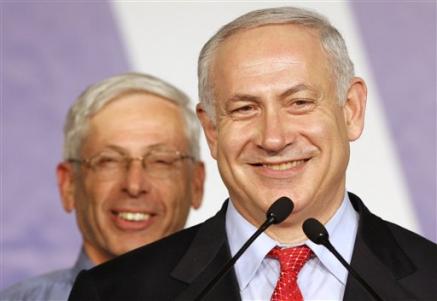2ND ROUNDUP: Netanyahu takes over amid calls to keep to peace process
 Jerusalem - New Israeli Prime Minister Benjamin Netanyahu formally took office Wednesday, with his predecessor and the country's president urging him to continue the peace process with the Palestinians.
Jerusalem - New Israeli Prime Minister Benjamin Netanyahu formally took office Wednesday, with his predecessor and the country's president urging him to continue the peace process with the Palestinians.
But Netanyahu's controversial choice for foreign minister , Avigdor Lieberman, later said Israel was not bound by the so-called Annapolis process which paved the way for the Israel-Palestinian peace talks that entered a hiatus when Israel headed for elections late last year.
It was unclear whether Lieberman, who made his remarks Wednesday afternoon, was articulating the policy of the new government.
"There is no other path for the state of Israel, other than striving for peace," outgoing premier Ehud Olmert told Netanyahu during the official handover ceremony in Jerusalem Wednesday morning.
"I am ending my task with a sense of pride and satisfaction," an at times visibly emotional Olmert, ending a 35-year political career, said.
"But one thing I didn't get to do. I didn't get to realize my dream of arriving at real peace with our neighbours," he added.
President Shimon Peres, who hosted the red-carpet ceremony at his official residence, urged the Netanyahu government to adopt, as had the previous government, "the vision of two states for two peoples, which the American administration initiated and which was accepted by the majority of countries of the world."
"It is up to your government to determine the shape of the coming reality," Peres told Netanyahu.
The president also mentioned the so-called Arab peace initiative, which speaks of recognition of the Jewish state in return for a full Israeli withdrawal from the occupied Palestinian territories.
"I do not know of any substitute for comprehensive regional peace, and this peace will also allow us to cope with any Iranian threat to take over the region, which is mainly Arab," he said.
The election of Netanyahu, leader of the hawkish Likud party, has raised fears that Israel will now adopt a harder line in talks with the Palestinians, or not follow up on previous negotiations, such as the Annapolis process, which the Olmert government accepted and which led to ongoing Israel-Palestinian peace talks.
Netanyahu, introducing his government to the Knesset Tuesday evening, said Israel wanted a "comprehensive peace" with the Arab and Muslim world, but made no mention of a Palestinian state alongside Israel, the intended end result of the Annapolis process.
Palestinian President Mahmoud Abbas, reacting to the new government Tuesday, said it "should recognize international resolutions and signed agreements and should accept the two-state solution so that we can resume talks with it."
Incoming Foreign Minister Lieberman, however, said in a handover ceremony at the Froeign Ministry that since the Israeli government and parliament had never formally ratified the statement from the Annapolis peace conference of November
2007, the new government was not bound by it.
Instead, he said, Israel would adhere to the "road map" peace plan, a performance-based initiative from 2003, which the Israeli government of the time had formally endorsed.
The plan, like the Annapolis process, is intended to end with the creation of an independent Palestinian state. But the sides never moved past the first stage, which calls on Palestinians to rein in militants and on Israel to cease settlement activity.
Netanyahu and his government were sworn in late Tuesday, after 69 of the Knesset's 120 lawmakers voted confidence in it. Another 45 voted against, while the remaining six abstained, including five Labour Party members who vehemently opposed their leader Ehud Barak's decision to join the Netanyahu coalition.
An Arab-Israeli legislator, Ahmed Tibi, also stayed away from the swearing-in as a protest against the right-leaning government.
After Wednesday's hour-long hand-over ceremony, the new cabinet, the 32nd in Israel's 60-year history, posed for its traditional photograph with the president, whose duties are largely ceremonial but who is the official head of state.
After the ceremony at the president's residence transfers of power took place in other ministries.
The Netanyahu government, with as many as 30 ministers and nine deputies, is the largest and most expensive in Israeli history.
Sworn in seven weeks after elections, it is the result of lengthy coalition negotiations, with Netanyahu, 59, making every effort to avoid a narrow right-wing government. He succeeded last week in convincing the Labour Party to join, when its convention voted in favour despite strong opposition within the party caucus.
Apart from Labour, the coalition includes only hardline, ultra-nationalist and ultra-Orthodox religious factions.
The last faction to join did so only on Wednesday morning. The deal with the five-seat, ultra-Orthodox United Torah Judaism party was signed after last-minute differences were resolved, and brings to 74 the number of legislators who support the government.
But it is unclear whether the five Labour Party legislators, who demonstratively refused to support the government in Tuesday night's confidence motion, will support the coalition in every vote.
Plagued by corruption allegations, Olmert resigned from the premiership in September, becoming a transitional premier and paving the way for early elections, held February 10, a year ahead of schedule.
Looking back at his premiership, he said: "I've made mistakes. I am not ashamed to say that. I am sorry for them." (dpa)